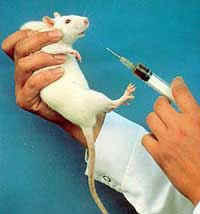10.28.2005 14:03
 The St. Petersburg Veterinary Academy this week committed itself to bringing an end to vivisection for educational purposes, becoming the first university in Russia to do so.
The St. Petersburg Veterinary Academy this week committed itself to bringing an end to vivisection for educational purposes, becoming the first university in Russia to do so.
Yelena Maruyeva, head of the Moscow-based Vita center which works to protect animal rights, said thousands of animals are killed annually by every veterinary institute in Russia for teaching purposes, despite alternative methods being used widely in developed countries.
Far more are killed in research on new drugs or cosmetic products.
“The Draize Rabbit Eye Test, which is horrendously stressful for the animal, is still being used in the cosmetics industry to test skin irritation but there is a reliable alternative method that uses an embryonated chicken egg, which has a very similar structure,” Maruyeva said.
“Imagine a rabbit with its head tightly fixed, with drops of new cosmetic products being tested on its eye — this is pure torture but it can be replaced perfectly adequately by a reliable non-animal technique,” she said.
“Students can use models, computer programs or simulators to practice,” said Nick Jukes, head of Interniche (the International Network for Human Education), a UK-based non-profit non-governmental organization represented in over forty countries.
Jukes said there are currently over 500 different techniques that can be used in teaching students that don’t involve killing animals, such as the use of models.
“Models help students to gain confidence when learning basic operations such as giving injections. It’s much more stressful to have to carry on sticking a needle into a live animal until it dies.”
Where real animals are essential, Interniche recommends the use of animals that have died of natural causes. “In every city it’s always possible to find enough animals which have died naturally or have been euthanised,” Jukes said. “As a final step in training, we suggest sending students to veterinary clinics to assist experienced specialists.”
Veterinary practices are often brutal in Russia. Piglets, for example, are castrated — so that they fatten up faster — without anesthetics, Maruyeva said. The entire veterinary system in the country needs an overhaul, she argued.
“Veterinarians in Russia are mainly trained to treat farm animals such as cows, pigs or poultry, which are traditionally viewed as producers of milk, eggs, poultry or meat, rather than as sensitive living creatures,” Maruyeva explained.
“In fur farms, animals are euthanised in a merciless way by using drugs to cause suffocation and paralysis. Other methods include gas poisoning or running a deadly dose of electricity through animals’ anal orifices,” she said.
Jukes said alternative methods have become the norm in most universities in developed countries. He pointed out that Ukraine embraced the new concept seven years ago, while several universities in Belarus tried the methods out three years ago.
Nevertheless, Russian universities have been slow to change over to new approaches, often for financial, rather than ethical reasons.
“In our department, computer simulators are especially precious: many drugs aren’t immediately available for training purposes or it’s too expensive to get them in large enough quantities for regular teaching,” explains Vladimir Sokolov, head of the pharmacology department of the St. Petersburg Veterinary Academy.
Sokolov said the introduction of computers has sparked the interest of students. “The more enthusiasm they show, the better they learn the subject,” he said. “We hope that other universities will follow our example soon.”
In Western Europe, most universities were forced to introduce alternative methods by frequent protests from students who pleeded their right not to kill animals in the practice of their professional duties.
Birgit Vollm, a graduate of the University of Frankfurt and the University of Witten/Herdecke in Germany, took the Frankfurt university to court in 1988 after failing to reach an agreement with her professors. She won the case and another that followed several years later.
“The court gave more weight to my freedom of conscience than to a professor’s freedom of teaching,” Vollm wrote in a report published on the Interniche website.
“I decided to continue my studies at another university where no animal experiments and dissections are done. I completed my studies and qualified at the University of Witten/Herdecke. But the lawsuit has not been in vain because it built the foundations for many other lawsuits in Germany,” she wrote.
This year, Interniche is offering a $20,000 grant to Russian universities willing to switch to alternative methods. Applications have to be submitted before Nov. 25.
News source: times.spb.ru
 Print this news Print this news
City news archive for 28 October' 2005.
City news archive for October' 2005.
City news archive for 2005 year.
|